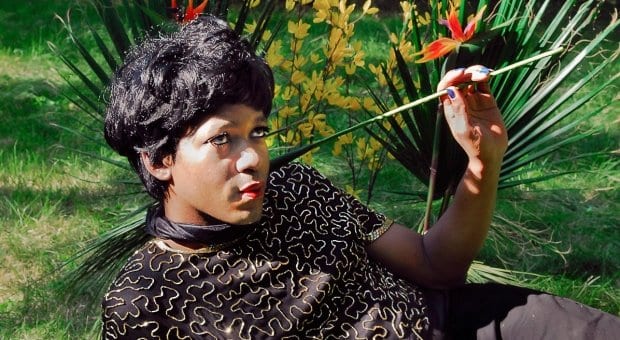Jef Barbara is talking career trajectories with an artist friend in Paris when Xtra phones for an interview. In the four years since the 38-year-old indie-pop musician adopted an effete, androgynous glam persona and started playing shows in Montreal’s now-defunct La Brique loft space, he is starting to make inroads in Europe.
The title track from his second album, Soft to the Touch (Club Roll Music), is getting radio play in France, and Parisians are starting to recognize him on the street. The album marks a move away from the icy electro beats of his debut, Contamination, toward more varied emotional and sonic territory. It’s a more ambitious effort all around: his airy crooning is surrounded by jangly riffs, squelchy synths, psychedelic effects and urgent rhythms, all glazed with his signature dreamy delicateness.
Xtra: Why is the visual side of music so important to you?
Jef Barbara: I’m in love with images, which explains why I can’t be in a relationship! The minute I get to know the person behind the image, it doesn’t work out. Especially with MTV, we’ve all grown up being taught that the visual has to accompany the music. Also, there’s the little girl in me that always enjoyed playing dress-up with my mom’s clothes and makeup. It’s intrinsically part of my personality to want to dress up and act up.
How has your music evolved since the first album?
The previous record was more sequenced and more obviously electronic, except for maybe one or two songs. I made a conscious effort to have more of a live rock and roll feel to it. I’ve become more skilled and precise in the way that I write lyrics, the way that I write music. My singing has improved. While I made Contamination, I mostly invested myself into my role as a singer. With this album, I learned the clarinet and I played vibraphone, piano, synths and percussion. I also improved the way I do my makeup. It’s a better me!
How did you end up collaborating with Lætitia Sadier from Stereolab?
I’m friends with Julien Gasc, who was part of the last live incarnation of Stereolab and played bass for Lætitia on her last solo tour. When they played Pop Montreal, I got him to put me on the guest list because I’d never seen her or Stereolab live. I was really seduced by her vocals and the way she sounded. After the show, I went home and it just dawned upon me: let’s make the song “Chords” a duet. It had already been recorded as a solo track, but I imagined her voice next to mine. I sent a message to Julien and asked him to put me in touch with Lætitia, and the rest is history.
The song “Florida Is the Future” touches on political issues. Do sociopolitical stories inspire you?
It does have that layer: “Florida is a swing state/swingers bask and procreate/ the bait the trap the muse.” The common perception is that I’m mostly interested in talking about sex and romance, but it’s not true. Those things are very much part of my life, so I’ll talk about them, but a person who has only heard Contamination would be surprised at the wider lyric range on this record. It just kind of happened. I’m not even trying to be cool about it.
The Pet Shop Boys have a song called “Ego Music” that is about pop stars who only write about love. Do you ever tire of pop music’s unwavering focus on romance?
It’s not what you talk about, but how you decide to talk about it. You could make fun of people who always tackle sex and romance, but in the end, it comes down to how well expressed the idea is. The same goes for love songs.
Your first album had a few songs you called gay manifestos. Are there any on this album?
I never thought of my songs being gay manifestos while writing them. It’s something that I realized after the fact. I’d rather sing about love, sex and romance matter of factly because I don’t feel political when I’m in lust with somebody. I guess there are LGBT manifestos in that I identify as a bi-gendered person. It is what it is. My songs are done with the same loving perspective that a cisgendered heterosexual person would bring to a love song.
What’s it like being bi-gendered a straight, male-dominated music industry?
I’m not really part of an industry yet. I have DIY roots, and it’s totally different. Everything that you see in Jef Barbara pertains to my very own artistic vision. The people that have decided to collaborate with me saw talent in me. They weren’t fazed by the fact that I’m queer. But I realize that it might be an issue for someone in an industry where they’re being asked to dress and sing a certain way. But I don’t deal with that. Some might feel hesitant to buy my records because of the way I look, but I’m not concerned with those people. If they’re not open to what I do simply for very superficial factors, then they don’t deserve to listen to my music.

 Why you can trust Xtra
Why you can trust Xtra


